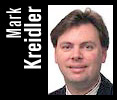 |

|
| Thursday, August 2 Tragedy won't stop athletes' push to the limit By Mark Kreidler Special to ESPN.com |
|||||||||||||||||
|
A couple of weeks ago, a triathlon blew through the area where we were on vacation -- no major international competition, no mega-prize money, pretty much your standard athletes-trying-to-push-through-it event. Toward the finish, I watched, dispassionately, as one of the stronger male entrants stopped briefly to vomit violently in a trash can placed along the side of the running course. He got sick again, then hopped back on the trail, headed for the tape. This man was no Korey Stringer. He was getting paid nothing -- and, it must be noted, he wasn't carrying 335 pounds and a set of football pads through 90-degree heat and Minnesota humidity.
But he was sick, and getting sicker; and he also was clearly determined to finish. And in that, he and Korey Stringer have more in common than you might think. The elite athletes, they push and they push and they push because, well, hell, they do. They push sometimes because they are trying to break through to another level of accomplishment, trying to hurdle "the wall" that separates them from where they want to be. They push sometimes because to admit that they can't is to jeopardize their standing as a team leader or, heaven forbid, a warrior. Can't play football without having a warrior on your team, you know. And so they push through nausea and sickness and headache and muscle cramps, and it's got nothing to do with medical knowledge or the vast advances in training technique from the silly old days of three-hour practices with no water breaks. At some point, it isn't about any of that, and no one knows it better than the people who are involved with it for a living. The elite of sport, they do this because they do it. On just about every level short of the kind of tragedy visited upon the Stringer family, in fact, it is part and parcel of what constitutes "elite" in sport at all. I am saying that the NFL doesn't have a crisis. It doesn't have an epidemic. What the pro football league has is a desperately horrible situation from which no one should flinch even for a moment. It is a situation from which, certainly, every available lesson about camp care and training method and reasonable prudence should be drawn and absorbed as though it were being presented for the first time.
But a crisis, no. And as much as it would comfort some people to be able to find someone or something to blame for Stringer's death, the truth may prove far too elusive for that kind of formula. It just isn't that simple. Elite athletes push, and in team settings they push others as well as themselves. And there is danger. In Stockton, Calif., a world away from the heat and humidity of Mankato, Minn., the head coach of the San Francisco 49ers, Steve Mariucci, began ticking off the list of precautions that his staff takes during summer training camp -- the mass hydration breaks, the rest breaks, the padless practices and on. Mariucci noted that the big linemen, people like Stringer, can lose 8 to 10 pounds in a single practice -- water loss, the coach said -- and that players are instructed on the warning signs of dehydration. "We monitor most everything these guys do: What they eat, what they put in their bodies," Mariucci said. "We constantly hydrate. We'll put guys on (fluid-replenishing) IVs if need be. Every camp does that." Later, though, Mariucci added this: "Part of that conditioning is pushing through it. Athletes don't stop because they're a little sweaty, you know? Some of 'em are so darned tough that they ignore the symptoms -- try to push through it." And that's the essence of the situation, really. The essence of it is that a part of every top-line athlete's conditioning is getting past barriers of fatigue, of sickness. It is actually, for many athletes, a precursor to a perceived long-term gain. Ignoring the warning signs, however ill-advised it may be, isn't a revolutionary concept at all. Happens every day. In NFL camps around the country, players and coaching staffs will be a little more careful this week. They'll stop for the extra bottle of water. They'll acknowledge that they need the break. They will remember Korey Stringer, a popular, well-liked Pro Bowl player, and they will shudder at the thought of the devastating loss to Stringer's family and his friends. And then, at some point, these elite athletes will fully resume the business of trying to achieve and maintain the absolute peak physical condition that they believe necessary either to get a job, keep a job or brilliantly excel at a job. They will resume pushing. It is what they do. Mark Kreidler of the Sacramento Bee is a regular contributor to ESPN.com. |
| ||||||||||||||||
